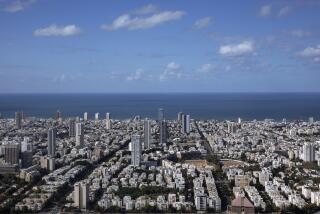Protests in Egypt dominate news coverage in Mideast
BEIRUT -- Coverage of the mass protests against Egyptian President Mohamed Morsi and the Muslim Brotherhood has been dominating news coverage in the Middle East.
Opinions about the demonstrations in the Arab world’s most populous nation differed sharply, depending on loyalties and political ideologies.
Anti-Muslim Brotherhood outlets, such as the state-controlled Syrian media, seemed to revel in Morsi’s tribulations, while many in the Islamist press spoke ominously of the protests’ origins and motivations.
Some commentators hailed a popular mass uprising against a leader losing his legitimacy. Egypt’s private Tahrir daily praised “millions of Egyptians” taking to the streets to bring down the Brotherhood rule.
PHOTOS: Massive protest against President Morsi in Egypt
Other outlets spoke of dark conspiracies and coups against the democratically elected Morsi. Some voiced concerns about military involvement in the protests and potential open confrontation between Morsi’s supporters and opponents.
Ghassan Charbel, editor of the London-based pan-Arab newspaper Al Hayat, penned an editorial arguing that Morsi’s repeated mistakes outraged the masses. But, he warned, the Muslim Brotherhood, a group that rose from being an outlawed organization to ruling the country, is a resilient movement and not likely to capitulate easily.
Qatar-based Al Jazeera Arabic initially seemed far less enthusiastic to cover the mass protests than other outlets, offering only sporadic reports as the demonstrations gathered momentum Sunday. But by Monday afternoon, the events in Egypt had usurped normal programming on the popular satellite channel. Al Jazeera English covered the protests extensively from the start.
Many, though not all, Persian Gulf-based newspapers initially refrained from featuring Egypt stories prominently on their websites and instead ran roundups in their world news sections.
The media coverage was split in Jordan, where the Islamist Hayat FM radio station was flooded with calls by listeners outraged that Egyptian protesters wanted to remove a democratically elected Islamic government.
The role of Washington drew scrutiny from many commentators. The U.S. has come under withering criticism for its role in Egypt from both pro- and anti-Morsi camps.
“Examining the U.S. stance toward Egypt, we find that the U.S. administration has not only started to pull the carpet from under the Muslim Brotherhood’s feet, it has also given the green light to the army to protect the will of the Egyptian people,” read an editorial titled “Egypt Sliding” in Saudi Arabia’s pro-government Al Watan newspaper, according to BBC Monitoring, which translates local press coverage.
In Iran, media outlets across the political spectrum featured Egypt coverage prominently.
A news presenter on Iran’s state-run English-language Press TV news channel opened the afternoon news bulletin by declaring that “tensions are soaring in Egypt” and citing reports of deaths in the protests.
Kayhan, a hard-line Iranian daily, dedicated its front page to Egypt. Some observers linked the move to Iran’s unhappiness with Cairo and the Muslim Brotherhood’s staunch support for the rebellion against Syrian President Bashar Assad, a close ally of Tehran.
But Iran’s reformist media was the most outspoken. The Sharq daily splashed the headline ”The Arab Spring Has Grabbed the Collar of Morsi Protesters in Tahrir Square Calling for Morsi’s Resignation” on its front page, accompanied by a photo showing a veiled woman striking a Morsi poster with a shoe.
The reformist Ghanoon also featured a bold front-page headline: ”Rebellion Against Morsi — The Rumor of a Coup Against President Morsi Is Gaining Momentum.” Alongside the headline was a large photo showing Egyptian women in head scarves holding signs declaring in Arabic, ”The end of the Muslim Brotherhood rule.”
In Syria’s government-run press, commentators gloated about the predicament of Morsi, who has called for the removal of Assad.
“The U.S.-planned Muslim Brotherhood experience has failed in less than two years,” wrote Bassim Hashim in an editorial published Tuesday in Syria’s Al Baath newspaper. “A whole network, allying ideologues of the crumbling empire, mercenaries, arms mafias and warmongers, is about to escape from the sinking boat. Obama is freeing himself from the moral consequences; Morsi is moving from one palace to another in an attempt to escape.”
In Israel, the press was paying extremely close attention to neighboring Egypt, with the main Hebrew dailies featuring front-page coverage and huge spreads on the protests. The story was also topping Israeli news sites and was the source of frequent updates on Israeli radio, including live interviews from Egypt. But, with the outcome of the crisis unclear, the initial coverage mostly focused on fast-paced events on the ground and not how the turmoil would ultimately affect Israel.
“There is no telling what will happen in Egypt, but I pray that they will find a solution,” Israeli President Shimon Peres said during a meeting with the visiting Italian prime minister, Enrico Letta. “What we are seeing in the Middle East is not a clash between civilizations but a clash within civilizations as people rise up against great existential problems like poverty, health and employment.”
ALSO:
In Pakistan, three bomb blasts kill at least 36
Putin: Edward Snowden can stay in Russia if he stops leaks
The Week Ahead: EU inducts Croatia, U.S. sanctions hit Iran
Sandels is a special correspondent. Also contributing to this report were special correspondents Nabih Bulos in Amman, Jordan, and Ramin Mostaghim inTehran; news assistant Batsheva Sobelman in Jerusalem; and Times staff writer Patrick J. McDonnell in Beirut.
More to Read
Start your day right
Sign up for Essential California for news, features and recommendations from the L.A. Times and beyond in your inbox six days a week.
You may occasionally receive promotional content from the Los Angeles Times.






